Formation des enseignants (BÉd) – spécialisation en français
Bonjour! Share your passion for speaking and teaching French. French teachers are in demand in BC schools. Why teach French?
Enseignez le français! Il y a un grand besoin en Colombie-Britannique d’enseignants qualifiés et dynamiques pour enseigner en français.
Elementary French Specialists
This cohort is designed for teacher candidates who wish to specialize in teaching French as a second language (French immersion or intensive French) or French as a first language (in a Francophone school) at the elementary level. Most courses are delivered and assignments are completed in French. This allows teacher candidates to continue to develop their proficiency while in the program.
Practicum placements are in Burnaby, Coquitlam, Delta, Langley, New Westminster, North Vancouver, Richmond, Surrey, Vancouver, or West Vancouver.
Elementary French specialists may teach French in elementary schools in the following ways:
- French immersion (early and late): Teach subject content in French starting in Kindergarten or Grade 1 (early), or Grade 6 (late).
- Intensive French: Teach French in an intensive immersion-like semester in Grade 6 and daily instruction in Grade 7.
- Francophone schools: Teach subject content in French within the Conseil Scolaire Francophone.
- Dual track schools: Teach a combination of core French and French immersion.
For more information on these programs, please consult this link.
Secondary French Specialists
When enrolled in the Secondary French specialist option, most of the classes are taught in French; as well, practica occur in French immersion, in regular schools offering core French, or in Francophone schools.
Learning content in French allows teacher candidates to continue to develop their French proficiency during the year. Teacher candidates may combine French with another teaching subject concentration (e.g., Spanish or Biology).
Secondary French specialists may teach French in secondary schools in the following ways:
- French immersion: Teach subject content in French.
- Core French: Teach French as a subject among general subjects in the regular English program.
- Francophone schools: Teach subject content in French within the Conseil Scolaire Francophone.
For more information on these programs, please consult this link.
Core French Requirements
To teach French as a subject among others in an English program (Grades 8 to 12), you need:
- Specific secondary academic courses and experience with children (13 to 17 years old)
- Successful completion of a French proficiency assessment
Please note, students who have passed the French Language Assessment (FLA) within two years of applying to the BEd program, will be accepted based on the current DELF/DALF equivalencies.
French Immersion Requirements
To teach in a French immersion context (Grades 8 to 12), you need:
- French immersion option is available for the following teachable subjects: Biology, Chemistry, Earth Science, Physics, History, Geography, Social Science, Mathematics, and French language and literature.
- In all teachable subjects, students must complete a minimum of 6 credits of French or English Literature and Composition.
- Applicants wishing to teach French language and literature are required to satisfy academic requirements for French as a teachable subject.
- Specific secondary academic courses and experience with youth (13 to 17 years old).
- Successful completion of a French proficiency assessment
Please note, students who have passed the French Language Assessment (FLA) within two years of applying to the BEd program, will be accepted based on the current DELF/DALF equivalencies.
Core French Option for Non-specialists
Learning and Teaching Core French as a Non-specialist
The Department of Language and Literacy Education (LLED) and the Teacher Education Office (TEO), with the participation of the Government of Canada and the Ministry of Education and Child Care of British Columbia, are pleased to offer the Core French Option for Non-specialists. This is an additional and concurrent option designed for elementary & middle years and secondary teacher candidates interested in teaching Core French in Grades 5-12.
This option is open to all non-specialists (anyone not in the French specialization cohort or French teachable), and provides both pedagogical and linguistic preparation to support learning and teaching French as an additional language.
Language & Professional Development
An important feature of our teacher education program is the support we have put in place, funded by the BC Ministry of Education, to support French teacher candidates during their program with additional coursework, weekend workshops, and summer institutes.
Professional Development Courses for French Teacher Candidates
Professional Oral Communication Skills for French Teachers
This optional course focuses on French language communication in the classroom and responds to the specific language needs teacher candidates encounter during their courses and practicum. Winter Term 1 (TBA). Learn more
LLED 421 – Gramligne: Learning and Teaching Grammar in Text for the Second Language Classroom (3 credits)
This optional course focuses on written French and offers teacher candidates an opportunity to enhance their linguistic and metalinguistic knowledge in French as well as acquire pedagogical strategies in French grammar teaching. Summer Term 2 (TBA). Learn more
LLED 423 – Teaching French Adolescent Literature (3 credits)
Summer Term 2
UBC Extended Learning – French Courses
Various dates. Explore courses
Workshops for French Teacher Candidates
Séjour
A bi-annual event that brings together French teacher candidates and educators for a fun-filled weekend of activities all in French. Learn more
Professional Development Courses for In-service Teachers
LLED 421 Gramligne: Apprendre et enseigner la grammaire communicative en langue seconde (3 credits)
Ce cours basé sur des textes communicatifs dans différents discours (narratif, argumentatif, descriptif, etc.) permet d’observer et de comprendre le fonctionnement des structures linguistiques au service de la communication. Il vous permettra de comprendre les mécanismes de la langue, d’améliorer vos connaissances linguistiques et métalinguistiques et vous montrera comment enseigner la grammaire de façon communicative. Learn more
LLED 423 – Enseigner la littérature francophone aux adolescents (3 credits)
Ce cours a pour but de permettre aux enseignants et futurs enseignants d’élargir et d’approfondir leurs connaissances de la littérature destinée à un jeune public, de manière à susciter chez eux une prise de conscience des multiples possibilités que leur offre la littérature jeunesse dans l’élaboration d’activités d’enseignement en français langue seconde.
Workshops & Institutes
L’institut de français, UBC à Québec
French language immersion in the heart of Quebec City. This is a three-week immersion program for teachers.
Séjour
A bi-annual event that brings together French teacher candidates and educators for a fun-filled weekend of activities all in French.
UBC Extended Learning French Summer Institutes
These lively and interactive summer institutes focus on the practical application of French through conversation and cultural experiences in a supportive, small group environment.
Master’s Programs
MEd in Modern Languages Education
Pour les enseignants des programmes d’immersion ou francophones, de français de base ou intensif.
Professional Language Portfolio
Resources
Bursaries for French Teacher Candidates
Avec la participation du gouvernement du Canada et du ministère de l’Éducation de la Colombie-Britannique/With the participation of the Government of Canada and the Ministry of Education of British Columbia
The Canadian Parents for French (CPF) BC & Yukon French Teacher Award
Canadian Parents for French (CPF) give out two annual cash awards valued at $2000 each to French language teachers who, within one year prior to the deadline, have been registered in their final year of a Bachelor of Education program. Applicants must have graduated from a high school in BC or Yukon and have completed at least one practicum in a French education setting within the last six months.
BC Ministry of Education Bursary for Pre-service French Teachers
The BC Ministry of Education offers a bursary for teacher candidates who complete more than 55% of their coursework in French. The bursary amount is up to $1,600 and depends on allocation guidelines set out by the BC Ministry of Education.
Bursaries are dispersed by UBC Enrolment Services when course registration information is received and language of instruction percentages are calculated. Bursaries will be distributed in Winter Term 2.
ACUFC bursary for Postsecondary Studies in French as a Second Language
English-speaking Canadians enrolled in the BEd program with at least 50% of their courses and related activities in French, have an opportunity to receive a $3,000 bursary to perfect their bilingualism while studying in a field of interest. This bursary has been made possible in part by the Government of Canada and is administered by the Association des collèges et université de la francophonie canadienne (ACUFC). Students will have an opportunity to apply in the fall after the start of their program.
More info:
Our Team
Susan Bowers
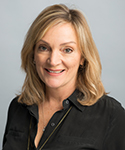
Ma passion pour les langues, surtout le français, m’a mené à poursuivre des études en français. Après avoir obtenu un baccalauréat en français à UBC et un Certificat en Enseignement des Langues Secondes de l’Université du Québec à Montréal, j’ai poursuivi une carrière en enseignement en immersion française et en français de base au niveau intermédiaire et secondaire à Delta. Plus récemment, je suis retournée à UBC faire la Maitrise en Éducation en Français (MLED) et maintenant, dans le cadre de mon rôle de responsable des programmes en français à la Faculté d’Éducation, j’ai le plaisir de soutenir les enseignants et les futurs enseignants dans leur développement professionnel et langagier. Comme tel, je m’occupe des initiatives comme Séjour UBC, l’Institut de français, UBC à Québec et le cours, Professional Oral Communication Skills for French Teachers. Lorsque je ne suis pas devant mon écran d’ordinateur, je passe mes temps libres à voyager, à regarder des films étrangers, à jardiner et à faire des promenades en forêt avec mon chien.
Richard Beaudry
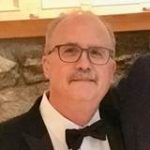
Richard Beaudry is an Information Specialist and Librarian. He has worked as a French immersion and computer studies teacher and teacher-librarian in K-12 schools. Richard has taught classes in the Teacher Librarianship Diploma Program at UBC and master’s programs in teacher-librarianship at the University of Alberta. Richard is an ALA Certified Librarian and a Fellow of the Library Association of Ireland. Richard is particularly known for his activities to promote human rights and freedom of information, particularly as they relate to the censorship of materials in school libraries. Richard was the recipient of the 2016 Canadian Library Association Award for the Advancement of Intellectual Freedom in Canada and the 2020 BCTLA President’s Award for his advocacy on behalf of school library learning commons’. Richard chairs the Canadian Federation of Library Associations/Fédération canadienne des associations de bibliothèques (CFLA-FCAB) Intellectual Freedom Committee, representing Canadian School Libraries and is part of a librarian working group in defence of intellectual freedom in Canadian Libraries at the Centre for Free Expression at Ryerson University.
Marie-France Berard
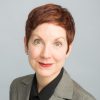
An art educator and art historian, Marie-France Berard has been committed to art museum education for more than twenty years. She holds both BA and MA in Art History from the University of Montréal, and was Responsable des visites at the Musée d’art contemporain de Montréal from 1995-2008. Marie-France is a member of the education team at the Vancouver Art Gallery and she is also president of the Special Interest Group in Education and Mediation in Museum (SIGEMM) within the Canadian Society for the Study of Education. Under the supervision of Dr. Dónal O’Donoghue, she completed her PhD in Curriculum Studies/Art Education at the University of British Columbia. Her doctoral research is an inquiry into the experience of encountering art using the theoretical concepts of desire and assemblage from philosopher Gilles Deleuze. She is also invested in contemporary art theory, the notion of the art museum educator as the Deleuzian ‘mediator’, in complicating the concepts of interpretation and knowledge in the art museum, and in creating pedagogical spaces of encounters for pre-service teachers.
Dr. Jason Ellis
Je suis historien de l’éducation et professeur agrégé dans le Department of Educational Studies. J’enseigne le cours EDST 401, Éducation, école et société. Originaire d’Ontario, je suis à UBC depuis 2013. Mon doctorat et ma maîtrise sont en histoire. Je possède aussi une formation d’enseignant, BEd aux niveaux intermédiaire et supérieur (7e à la 12e année), histoire et français langue seconde, de l’IPÉO (alias-OISE)-University of Toronto.
Nicole George
Bonjour! Originaire d’Ottawa, j’en suis à ma sixième année en tant que professeure auxiliaire et à ma cinquième année à titre de conseillère pédagogique (Faculty Advisor). Je suis toujours enseignante en immersion avec le Conseil scolaire de Vancouver (VSB), et ce, depuis 2006. Au cours de mon parcours d’enseignement en salle de classe, j’ai enseigné dans les programmes d’immersion élémentaire/secondaire, de français de base, du Baccalauréat International, et du Advanced Placement avant de devenir Chef de département des langues modernes et Mentor en littératie pour les enseignants du VSB. Je m’intéresse aux questions de compétences culturelles, de communication authentique, de littératie équilibrée, de l’enseignement du français en milieux minoritaires et de l’intégration des perspectives autochtones en salle de classe. J’en suis à ma troisième année en tant que membre du comité exécutif de l’APPIPC à titre de trésorière.
Dans le programme de formation à l’enseignement à UBC, j’ai l’occasion d’enseigner les cours Teaching French Language and Literacy : Secondary, Introduction to Teaching and Learning French : Elementary, Séminaires d’enquête I, II, III, Éducation autochtone au Canada, et Oral Language Support for French Teacher Candidates. J’ai aussi la chance de pouvoir contribuer à diverses autres occasions de développement linguistique et professionnelle, tels que les ateliers Séjours UBC. Les cours enseignés dans le passé comprennent Literacy Practices and Assessment : Elementary ainsi que Literacy Practices and Assessment : Secondary.
Sandi Kostur
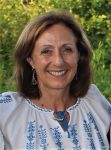
Bonjour! C’est mon grand plaisir de faire partie de l’équipe professionnelle de la formation des maitres en français. Je suis la coordonnatrice de la cohorte française élémentaire, professeure auxiliaire et conseillère pédagogique pour nos stagiaires.
Over the course of my career, I have worked in elementary, secondary and university settings in French immersion, core French, Spanish and fine art programs. I have served as a teacher, department head, administrator, and helping teacher (district language programs consultant). My areas of interest include communicative language teaching, and teaching language through the arts and culture.
In the past I have served as a DELF examiner and trainer. Currently, in addition to my work at UBC, I work with Delta Continuing Education as exam coordinator for Language Challenge exams.
David Langmuir
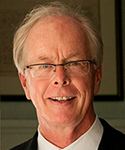
Bonjour! Je m’appelle David Langmuir. C’est ma deuxième année en tant que conseiller pédagogique avec le TEO et je suis excité de travailler avec vous cette année académique. Onze mois de travail, de joie, de souci et finalement de succès! Ce sera une grande aventure ensemble!
J’habite West Point Grey avec ma femme (enseignante, elle aussi). Nous avons trois enfants and trois petits-enfants (jusqu’au présent). Je tiens un bac en éducation secondaire de UBC (1977). J’ai fait ma maîtrise en administration scolaire à Victoria (1982) et j’ai obtenu un doctorat en Educational Studies de UBC (1998). Depuis 30 ans, j’ai été directeur d’école en trois provinces. J’ai pris ma retraite en 2015 après 23 ans à West Vancouver.
Peggy Lee
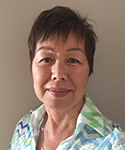
Quel plaisir pour moi de retourner à mon alma mater en tant que conseillère pédagogique pour la cohorte française! Après avoir obtenu mon bac en français et mon diplôme d’enseignement, j’ai enseigné dans le programme d’immersion précoce à Abbotsford pendant trois ans. Ensuite j’ai travaillé pendant une trentaine d’années à Surrey en tant qu’enseignante, consultante, et directrice à trois écoles élémentaires avant de prendre ma retraite en janvier, 2015. Durant ces années de travail enrichissant, j’ai aussi eu l’occasion d’enseigner à Beijing, de travailler comme conseillère pédagogique à UBC et d’obtenir une maîtrise en éducation. Parmi les plus beaux souvenirs de ma carrière : la passion des enseignants débutants que j’ai embauchés, une rencontre avec monsieur Pierre Trudeau à notre école, où il voulait voir la réalisation de sa vision de bilinguisme au Canada, et la semaine avant ma retraite, un concert à mon école où une élève, réfugiée récemment arrivée, a chanté et dansé sur scène avec ces camarades de classe.
Dr. Hélène Leone
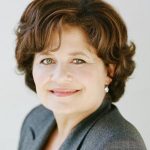
Dr. Hélène Leone earned her PhD in Education from the University of Ottawa, and her Masters in Communications from Simon Fraser University. She has taught students from kindergarten to the university level. As a lecturer, Dr. Leone has taught bilingual education in teacher professional development programs, social justice across the curriculum, as well as education and the media at the University of British Columbia, Simon Fraser University, and Thompson Rivers University. Dr. Leone has also been the Diploma Programme Coordinator, and Head of Modern Languages in the International Baccalaureate Programme (IB). Dr. Leone has worked as a field researcher for the Office of the Commissioner of Official Languages, the Fédération culturelle-canadienne française, and Heritage Canada. She has spoken and consulted internationally in Canada, the United States, Switzerland, Morocco, Qatar, England, and France. Dr. Leone is the founder of the Canadian Bilingual School of Paris, a British Columbia offshore school for students in kindergarten to grade 12.
André Elias Mazawi

André Elias Mażāwi, sociologue de l’éducation, est professeur titulaire au Département d’études en éducation, Faculté de l’Éducation, Université de la Colombie-Britannique. Il est aussi professeur affilié au Centre euro-méditerranéen de recherche en éducation de l’Université de Malte et chercheur affilié à l’Équipe de recherche en dimensions internationales de l’éducation (ERDIE) de l’Université de Genève. Ses intérêts académiques sont dans les domaines de la politique culturelle de la scolarité et de l’enseignement supérieur, les intersections entre le colonialisme et l’éducation, avec une attention particulière aux effets de la privatisation et de la géopolitique sur les politiques scolaires et éducatives, la gouvernance scolaire et la restructuration de l’enseignement supérieur en la région arabe. Avec Ronald G. Sultana, il a co-édité l’Annuaire mondial de l’éducation 2010, Education in the ‘Arab World’: Political Projects, Struggles, and Geometries of Power (Londres: Routledge, 2010). Avec Mark Bray et Ronald G. Sultana, il a co-dirigé le livre Private Tutoring Across the Mediterranean: Power Dynamics and Implications for Learning and Equity (Pays-Bas: Sense Publishers, 2013). Avec Michelle Stack, il a co-dirigé le livre Course Syllabi in Faculties of Education: bodies of Knowledge and their Discontents, International Perspectives (New York: Bloomsbury Academic, 2020). Son article, “Colonialismes, adversités et statut apatride: La condition enseignante dans le contexte palestinien”, a paru dans Formation et Profession, 27(1), pp. 37-57, 2019.
Liza Navarro
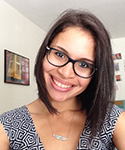
Liza Navarro is a PhD student in the Department of Language and Literacy Education. She has a background in the French language and has a Master of Arts in French from the University of British Columbia (UBC). Her research interests include language education (primarily French), intercultural competence, teacher education and open education resources. Liza’s previous experience includes instructing undergraduate French courses (beginner and intermediate French) at UBC as well as various graduate research assistant positions tied to French language learning. She is fascinated with the language and is always eager to lend a hand to French instructors and learners. This school year she will teach LLED 353 and she will be working on a small Teaching and Learning Enhancement Fund as project coordinator to provide support to French teacher candidates in helping them develop their digital competencies. In addition, she has received an Open Education Research fellowship, which will allow her to share her passion with others.
Romina Simian
Bonjour! J’ai obtenu mon BEd (Secondary French) à UBC en 2008 et ma MEd en 2010 toujours à UBC dans la cohorte française (MLED). Pendant les 12 dernières années, j’ai enseigné des cours de français de base, français langue seconde – immersion et italien. J’ai aussi enseigné l’anglais langue seconde en Italie pendant deux ans. Avant de devenir conseillère pédagogique à UBC en 2018, j’ai été chef de département des langues modernes et coordinatrice du programme d’immersion française au niveau secondaire dans le conseil scolaire de Burnaby. Je me passionne pour le plurilinguisme, l’enseignement et l’acquisition des langues secondes ainsi que la technologie et l’évaluation dans la salle de classe.
Robert Swansborough
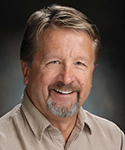
Involved in core French and immersion programs since 1975, I’ve been active in promoting second language education in three BC school districts as a teacher, consultant and administrator. I have taught all levels from kindergarten through university. The years served as president of the BC Association of Teachers of Modern Languages and as vice-president of the Canadian Association of Second Language Teachers has provided me with both provincial and national perspectives of the complex issues surrounding second language education. Over the years, I have co-authored several works dealing with the delivery, promotion and evaluation of French language programs. Until recently, I have been principal of a single-track French immersion school in West Vancouver. Currently, I am delighted to be a faculty advisor with the French cohort at UBC in the Faculty of Education.
Diane Tijman
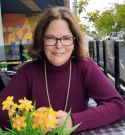
Diane Tijman has enjoyed being a faculty advisor since her retirement from the Richmond School Board in 2016. In addition to many years of teaching French, she worked as the Richmond District Curriculum Coordinator in Modern Languages and ELL. Previously, she taught from Grade 4 through to university in three districts in BC.
Being multilingual has opened many doors for Diane, including the opportunity to serve on the boards of the British Columbia Association of Teachers of Modern Languages, the BC Language Coordinators Association, the Canadian Association of Second Language Teachers, and Canadian Parents for French. As well, she has participated in the BC Ministry of Education’s curriculum writing teams for French and Spanish and lead the English Language Learning tools project. Diane also helped to develop the ESL curriculum in Cuba and has presented numerous times at local, provincial and national conferences. All of these experiences have galvanized her understanding of strong second language programs and excellence in teaching. In addition to enjoying her work as faculty advisor, Diane continues to share her love of languages in her service on the boards for Canadian Parents for French and Richmond Multicultural Community Services.
Tim Waddington
Dr. Tim Waddington has over 20 years experience as a public school educator and advocate for children and youth. With advanced degrees in Education Leadership and the Philosophy of Education, Tim infuses a rich understanding of Imaginative Education and Applied Teacher Research into both his teaching and scholarship. Dr. Waddington currently holds a position lecturer in the Faculty of Education at UBC, as well as a seat on the Academic Council with the Centre for Imagination in Research, Culture and Education based at Simon Fraser University. Tim is passionate about intellectually rigorous and emotionally engaging curriculum, with expertise in the subject areas of history and the humanities, particularly as it pertains to Philosophic and Ironic Understandings. His ongoing research is centered upon imagination (in particular Imaginative Historical Inquiry), theories of irony, ethics in curriculum and instruction, and possible existential outcomes for both teachers and learners alike.
Meike Wernicke
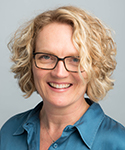
Bonjour! Je suis d’origine allemande et depuis mon arrivée en Colombie-Britannique j’ai été scolarisée en anglais, en français, et en allemand (ma langue d’origine). Je suis diplômée en français et espagnol avec une spécialisation en linguistique et je détiens un doctorat en didactique des langues secondes depuis 2013. Actuellement, je supervise et donne des cours dans la maîtrise en éducation française à UBC dans le Département de didactique des langues et de littératie. Mes cours portent sur la linguistique appliquée, les théories et recherches sur l’enseignement des langues vivantes, et l’éducation interculturelle. Dans la formation des enseignants à UBC je supervise le programme français et j’enseigne LLED 353 et LLED 360 qui traitent de l’enseignement de l’anglais langue seconde. Dans le cadre des études en didactique des langues secondes, je m’intéresse au plurilinguisme, la formation continue et la construction identitaire des enseignants de langue, ainsi que l’apprentissage et l’enseignement du français langue seconde dans le contexte canadien.


